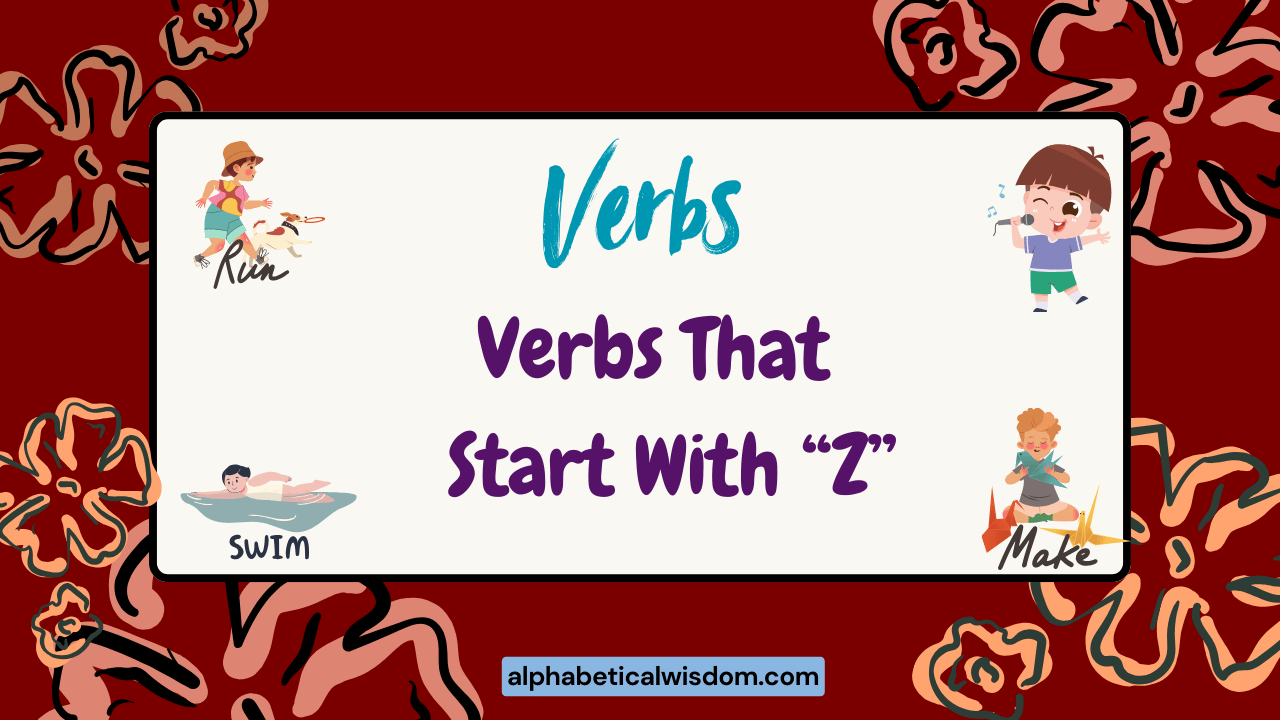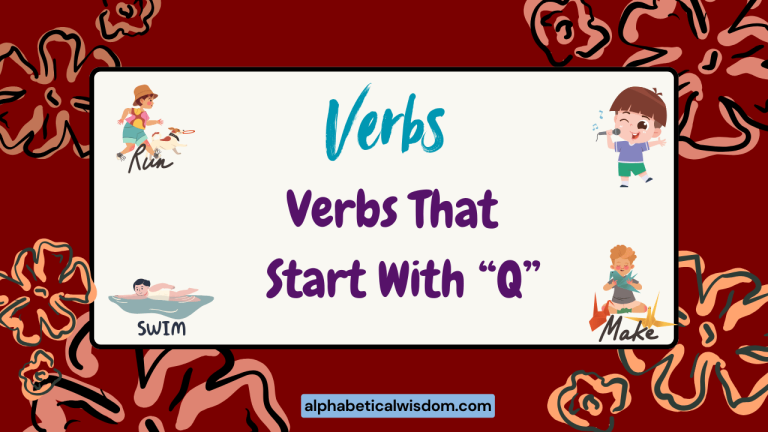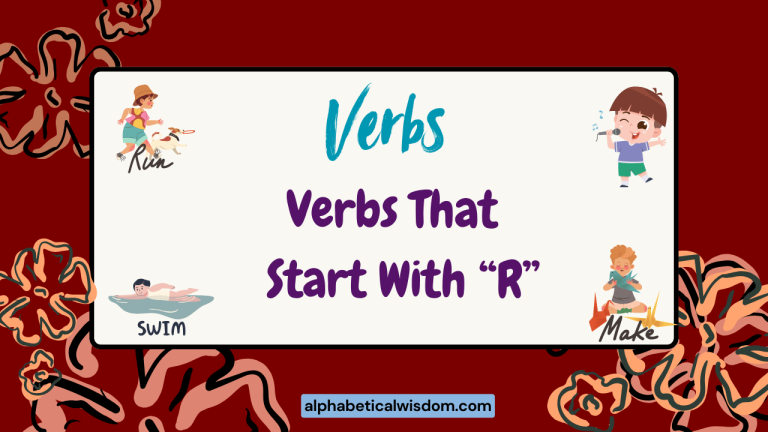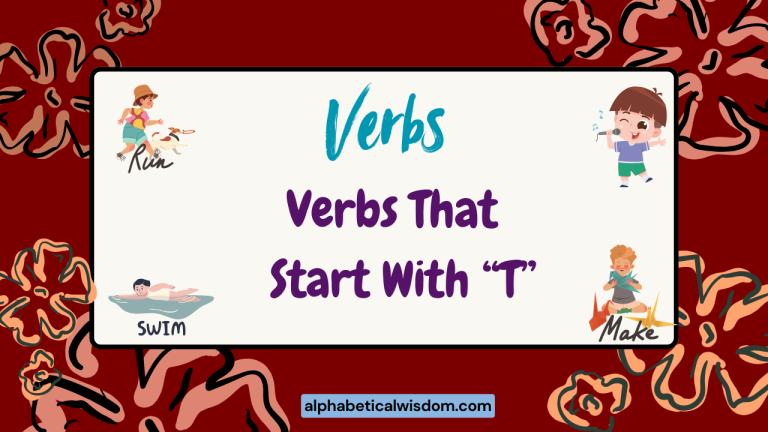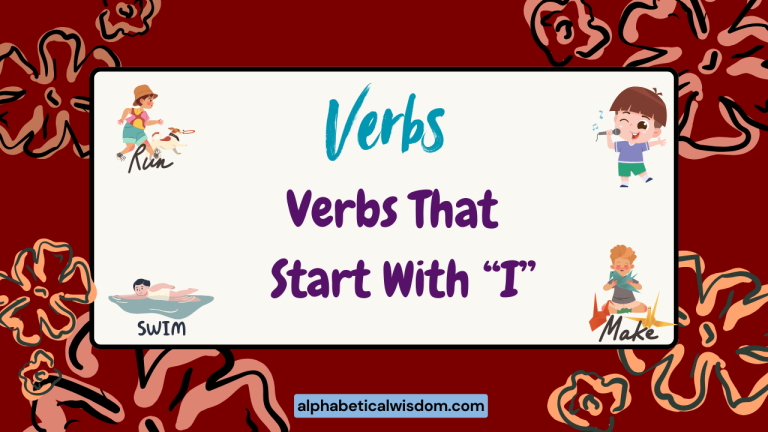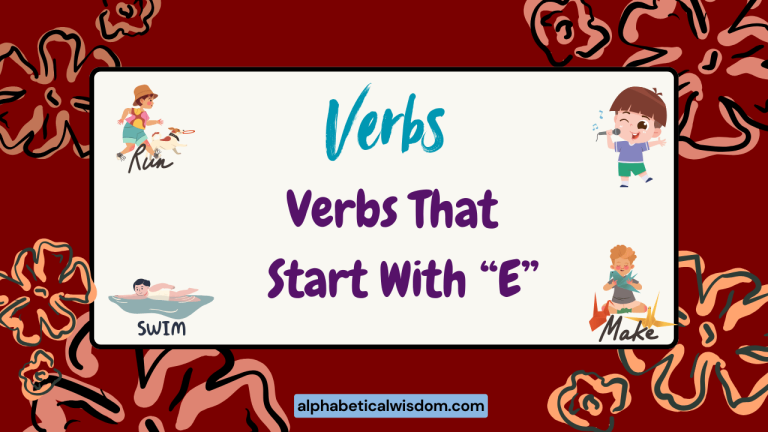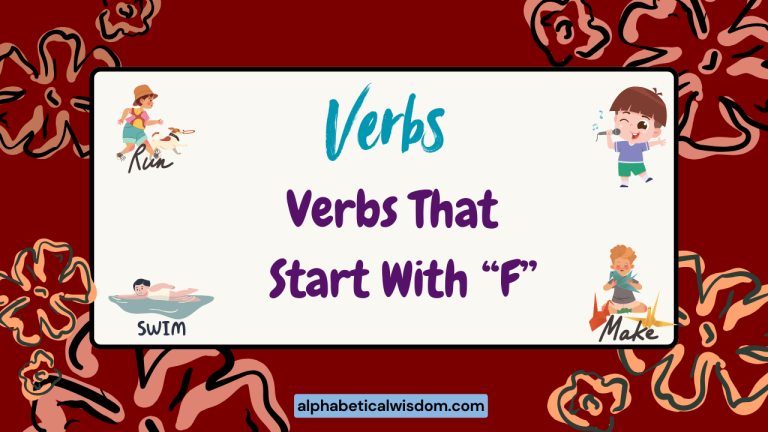Verbs Starting With Z: A Comprehensive Grammar Guide
Understanding verbs that start with the letter ‘Z’ can significantly enrich your English vocabulary and improve your ability to express nuanced meanings. While not as common as verbs starting with other letters, ‘Z’ verbs offer unique ways to describe actions, states, and processes.
This article provides an in-depth exploration of these verbs, covering their definitions, structural elements, usage rules, and common mistakes. It’s designed for English language learners of all levels, from beginners to advanced speakers, as well as educators seeking comprehensive resources.
Table of Contents
- Introduction
- Definition of Verbs Starting With Z
- Structural Breakdown of Verbs Starting With Z
- Types and Categories of Verbs Starting With Z
- Examples of Verbs Starting With Z
- Usage Rules for Verbs Starting With Z
- Common Mistakes with Verbs Starting With Z
- Practice Exercises
- Advanced Topics
- FAQ
- Conclusion
Definition of Verbs Starting With Z
A verb is a word that describes an action, occurrence, or state of being. Verbs are the core of the predicate of a sentence and are crucial for conveying what the subject is doing or experiencing.
Verbs starting with ‘Z’ function just like any other verb in the English language, but their selection is often more deliberate due to their relative scarcity. These verbs can be classified based on their function (action, state, or occurrence) and their transitivity (whether they take a direct object or not).
The classification of verbs starting with ‘Z’ includes several categories: action verbs describe physical or mental actions, linking verbs connect the subject to a descriptive word or phrase, and auxiliary verbs (also known as helping verbs) assist the main verb in expressing tense, mood, or voice. Understanding these classifications helps in using ‘Z’ verbs correctly in various contexts. The function of these verbs is to provide specific and often unique ways to express actions or states, adding richness to communication.
Contextually, verbs starting with ‘Z’ might appear in technical, scientific, or specialized fields. For example, ‘zone’ might be used in urban planning or sports, while ‘zero’ could appear in mathematical or financial contexts.
The meaning and usage of these verbs can vary depending on the context, so it is important to consider the surrounding words and phrases to fully understand their intended meaning.
Structural Breakdown of Verbs Starting With Z
The structural breakdown of verbs starting with ‘Z’ is similar to that of other English verbs. They follow standard conjugation rules, changing form to indicate tense (present, past, future), aspect (simple, continuous, perfect), and mood (indicative, imperative, subjunctive).
Understanding these structural elements is essential for using ‘Z’ verbs accurately.
The basic form of a verb is its base form, also known as the infinitive without ‘to’. For example, the base form of ‘zone’ is ‘zone’.
This form is used in the present tense (except for the third-person singular, which adds ‘-s’ or ‘-es’) and with modal verbs (e.g., can, will, should). The past tense and past participle forms are created by adding ‘-ed’ to regular verbs, but some ‘Z’ verbs may be irregular.
The present participle is formed by adding ‘-ing’ to the base form (e.g., zoning). This form is used in continuous tenses, such as the present continuous (e.g., is zoning) and past continuous (e.g., was zoning).
Understanding these patterns allows for correct verb conjugation and usage in different tenses and aspects. Regular verbs follow predictable patterns, while irregular verbs require memorization of their specific forms.
Types and Categories of Verbs Starting With Z
Verbs starting with ‘Z’ can be categorized based on their transitivity and function. Understanding these categories helps in using the verbs correctly in different sentence structures.
The main categories include transitive verbs, intransitive verbs, linking verbs, and auxiliary verbs.
Transitive Verbs
Transitive verbs are verbs that take a direct object. The direct object is the noun or pronoun that receives the action of the verb.
In other words, the action of the verb “transits” to the object. Examples of transitive verbs starting with ‘Z’ include ‘zap’ (to strike or destroy suddenly) and ‘zone’ (to designate an area for a specific purpose).
Understanding transitive verbs helps in constructing grammatically correct sentences with direct objects.
For example, in the sentence “The laser zapped the target,” ‘zapped’ is a transitive verb, and ‘the target’ is the direct object. The verb acts upon the object.
Transitive verbs are essential for expressing actions that directly affect someone or something. They provide clarity and specificity to sentences.
Intransitive Verbs
Intransitive verbs do not take a direct object. The action of the verb does not “transit” to an object.
Examples of intransitive verbs starting with ‘Z’ include ‘zoom’ (to move quickly) and ‘zeal’ (to show enthusiasm). Intransitive verbs often describe states or actions that do not require an object to complete their meaning.
For example, in the sentence “The car zoomed past,” ‘zoomed’ is an intransitive verb. There is no direct object receiving the action of zooming.
Intransitive verbs are important for describing actions or states that are complete in themselves. They add variety and depth to expressive language.
Linking Verbs
Linking verbs connect the subject of a sentence to a noun or adjective that describes or identifies the subject. They do not express action but rather link the subject to additional information.
While less common with ‘Z’ verbs, a verb like “zero” (in the sense of ‘amount to’) can sometimes function as a linking verb. For example, “His chances zeroed after the mistake.”
In this case, ‘zeroed’ links ‘his chances’ to the state of being effectively nullified. Linking verbs are essential for providing descriptive information about the subject of a sentence.
They create a connection between the subject and its attributes.
Auxiliary Verbs
Auxiliary verbs, also known as helping verbs, assist the main verb in expressing tense, mood, or voice. There are no common auxiliary verbs starting with ‘Z’ in standard English.
Auxiliary verbs are crucial for forming complex verb tenses and expressing different shades of meaning.
Examples of Verbs Starting With Z
Providing examples is crucial for understanding how verbs starting with ‘Z’ are used in context. The following sections offer extensive examples of transitive, intransitive, and linking verbs.
These examples illustrate the different ways these verbs function in sentences.
Transitive Verb Examples
Transitive verbs require a direct object to complete their meaning. The following table provides examples of transitive verbs starting with ‘Z’ with corresponding sentences.
Below is a table containing 30 examples of transitive verbs that start with the letter ‘Z’, along with sentences that illustrate their usage.
| Verb | Sentence Example |
|---|---|
| Zap | The superhero zapped the villain with a laser beam. |
| Zone | The city council zoned the area for commercial development. |
| Zero | The accountant zeroed the balance after the audit. |
| Zip | She zipped her jacket before going outside. |
| Zinc | The factory zincs metal parts to prevent corrosion. |
| Zombify | The virus zombified the population in the movie. |
| Zoom | The photographer zoomed the camera lens to capture the detail. |
| Zephyr | The gentle breeze zephyred the curtains. |
| Zigzag | The driver zigzagged the car through the traffic cones. |
| Zeroize | The software zeroized the hard drive before disposal. |
| Zealot | The politician zealoted his supporters with promises of change. |
| Zest | The chef zested the lemon to enhance the flavor of the dish. |
| Zone off | The construction workers zoned off the area for safety. |
| Zoom in | The artist zoomed in on the canvas to paint the intricate details. |
| Zip up | He zipped up his suitcase before leaving for the airport. |
| Zero out | The company zeroed out its debt by selling assets. |
| Zone out | The teacher zoned out the disruptive students for their bad behavior. |
| Zap away | The magician zapped away the rabbit during the show. |
| Zing | The comedian zinged the audience with a witty joke. |
| Zonk | The fighter zonked his opponent with a powerful punch. |
| Zeppelin | The engineer tried to zeppelin the design for the new airship. |
| Zest up | She zested up the party with her lively music and dancing. |
| Zigzagged | The skier zigzagged down the mountain slope. |
| Zither | The musician attempted to zither a complex melody for the audience. |
| Zoned | The architect zoned the building plans for the new development. |
| Zoomified | The software zoomified the image to reveal hidden details. |
| Zeal | The activist zealed the crowd with passionate speeches. |
| Zippy | The chef zippied the sauce with a dash of hot pepper. |
| Zero-rate | The government zero-rated essential goods to lower the cost of living. |
| Zestify | The bartender zestified the cocktail with a twist of orange peel. |
These examples demonstrate how transitive verbs starting with ‘Z’ are used to express actions that directly affect an object. Understanding these patterns helps in constructing clear and grammatically correct sentences.
Intransitive Verb Examples
Intransitive verbs do not require a direct object to complete their meaning. The following table provides examples of intransitive verbs starting with ‘Z’ with corresponding sentences.
Below is a table containing 30 examples of intransitive verbs that start with the letter ‘Z’, along with sentences that illustrate their usage.
| Verb | Sentence Example |
|---|---|
| Zoom | The car zoomed past on the highway. |
| Zing | The energy in the room zinged with excitement. |
| Zone out | Sometimes, I just zone out during long meetings. |
| Zest | He zestfully pursued his hobbies. |
| Zigzag | The path zigzagged through the forest. |
| Zero | The thermometer zeroed during the cold night. |
| Zeal | She zealously volunteered for the cause. |
| Zephyr | The wind zephyred softly through the trees. |
| Zip | The bullet zipped through the air. |
| Zonk out | After a long day, I just zonk out on the couch. |
| Zither | The musician zithered beautifully at the concert. |
| Zero in | The detective zeroed in on the main suspect. |
| Zowie | Zowie, that was an amazing performance! |
| Zonked | He felt completely zonked after the marathon. |
| Zizz | The bees zizzed busily around the flowers. |
| Zaftig | She zaftigly danced to the music. |
| Zapped | I felt totally zapped after the intense workout. |
| Zinged | The joke zinged and made everyone laugh. |
| Zealot | He zealoted for his beliefs, never wavering. |
| Zigged | The road zigged sharply to the left. |
| Zoomed in | The camera zoomed in on the bird in the tree. |
| Zipped | The ice skater zipped across the rink. |
| Zoned | He zoned off for a while, lost in thought. |
| Zonks | The sound of the alarm zonks me awake every morning. |
| Zed | The letter Z zed off the end of the alphabet. |
| Zephyred | The curtains zephyred in the gentle breeze. |
| Zestfully | She zestfully embraced the new challenges. |
| Zizzle | The bacon zizzled in the pan. |
| Zeroing | The team is zeroing in on the solution. |
| Zoning | The city is zoning for new developments. |
These examples illustrate how intransitive verbs starting with ‘Z’ are used to express actions or states that do not require an object. They add detail and nuance to descriptions.
Linking Verb Examples
Linking verbs connect the subject to a noun or adjective that describes or identifies the subject. The following table provides examples of linking verbs starting with ‘Z’ with corresponding sentences.
Below is a table containing 10 examples of linking verbs that start with the letter ‘Z’, along with sentences that illustrate their usage. Because there are limited linking verbs starting with ‘Z’, some examples use ‘zero’ or related words in a linking context.
| Verb | Sentence Example |
|---|---|
| Zero | His chances of winning zeroed after the mistake. |
| Zeroed | The temperature zeroed during the night, becoming dangerously cold. |
| Zone | The atmosphere in the room zoned into a state of complete relaxation. |
| Zoned | He zoned into a state of deep concentration during the exam. |
| Zeroing | The effort was zeroing in on a positive outcome. |
| Zeal | Her zeal for the project zeal into a passionate commitment. |
| Zest | The event zest into a lively celebration. |
| Zoning | The project was zoning into a state of disarray. |
| Zeroing | The project was zeroing on completion. |
| Zeroed | The team’s hopes zeroed as the game ended. |
These examples demonstrate how linking verbs starting with ‘Z’ connect the subject to a descriptive word or phrase, providing additional information about the subject’s state or condition. While less common, they serve an important function in descriptive writing.
Usage Rules for Verbs Starting With Z
Proper usage of verbs starting with ‘Z’ requires adherence to standard English grammar rules, including tense agreement, subject-verb agreement, and understanding irregular verb forms. The following sections outline these rules and provide examples.
Tense Agreement
Tense agreement ensures that the verbs in a sentence or paragraph are consistent in time frame. If the main verb is in the past tense, supporting verbs should also be in the past tense, unless there is a specific reason to indicate a different time frame.
Maintaining tense agreement is crucial for clarity and coherence in writing.
For example, “He zoomed past the finish line and celebrated his victory” maintains tense agreement because both ‘zoomed’ and ‘celebrated’ are in the past tense. An incorrect example would be “He zoomed past the finish line and celebrates his victory,” which mixes past and present tenses inappropriately.
Subject-Verb Agreement
Subject-verb agreement requires that the verb agrees in number with its subject. Singular subjects take singular verbs, and plural subjects take plural verbs.
This rule is fundamental to grammatical correctness. Paying attention to subject-verb agreement ensures clarity and avoids grammatical errors.
For example, “The car zooms quickly” is correct because ‘car’ is singular, and ‘zooms’ is the singular form of the verb. “The cars zoom quickly” is also correct because ‘cars’ is plural, and ‘zoom’ is the plural form of the verb.
An incorrect example would be “The car zoom quickly,” which violates subject-verb agreement.
Irregular Verbs Starting With Z
Irregular verbs do not follow the standard pattern of adding ‘-ed’ to form the past tense and past participle. While there are fewer irregular verbs starting with ‘Z’, it’s important to identify and memorize them.
Knowing the correct forms of irregular verbs is essential for accurate writing and speaking.
For example, while “zone” is a regular verb (zoned, zoned), there might be less common or archaic verbs with irregular forms. Always consult a dictionary or grammar guide when unsure of a verb’s form.
Paying attention to irregular verbs improves grammatical accuracy and fluency.
Common Mistakes with Verbs Starting With Z
Even experienced English speakers can make mistakes when using verbs starting with ‘Z’. Common errors include incorrect tense usage, subject-verb disagreement, and misuse of transitive and intransitive verbs.
Recognizing and correcting these mistakes can significantly improve your writing and speaking skills.
One common mistake is using the present tense when the past tense is required. For example: Incorrect: “Yesterday, he zoom past the traffic.” Correct: “Yesterday, he zoomed past the traffic.” Another mistake is incorrect subject-verb agreement: Incorrect: “The cars zooms quickly.” Correct: “The cars zoom quickly.” Understanding and avoiding these common errors enhances grammatical accuracy.
Another frequent error involves confusing transitive and intransitive verbs. For example: Incorrect: “He zoomed.” (when a direct object is clearly implied).
Correct: “He zoomed the camera.” (when specifying what he zoomed). Paying attention to the verb’s transitivity ensures that sentences are grammatically complete and clear.
Practice Exercises
Practice exercises are essential for reinforcing your understanding of verbs starting with ‘Z’. The following exercises cover various aspects of verb usage, including tense agreement, subject-verb agreement, and correct verb forms.
Completing these exercises will help solidify your knowledge and improve your ability to use these verbs accurately.
Exercise 1: Fill in the Blanks
Fill in the blanks with the correct form of the verb starting with ‘Z’ provided in parentheses.
Below is a table of 10 sentences, each with a blank to be filled with the correct form of a verb starting with ‘Z’. The correct answers are provided below the table.
| Question | Answer |
|---|---|
| 1. The bee ________ around the flower. (zizz) | |
| 2. The city council ________ the area for residential use. (zone) | |
| 3. The car ________ past us on the highway. (zoom) | |
| 4. He ________ out during the boring lecture. (zone) | |
| 5. She ________ her jacket before going outside. (zip) | |
| 6. The laser ________ the enemy spaceship. (zap) | |
| 7. The path ________ through the mountains. (zigzag) | |
| 8. The temperature ________ to zero last night. (zero) | |
| 9. She ________ up the party with her enthusiasm. (zest) | |
| 10. The program ________ the hard drive for security. (zeroize) |
Answers:
- zizzed
- zoned
- zoomed
- zoned
- zipped
- zapped
- zigzagged
- zeroed
- zested
- zeroized
Exercise 2: Sentence Correction
Correct the sentences below that contain errors in verb usage.
Below is a table containing 10 sentences. Some of these sentences contain errors in the usage of verbs starting with ‘Z’.
Identify the incorrect sentences and correct them. Correct answers are provided below the table.
| Question | Answer |
|---|---|
| 1. He zone out during the movie. | |
| 2. The car zooms past quickly. | |
| 3. The bees zizzes around the garden. | |
| 4. She zipped her bag before leaving. | |
| 5. Yesterday, he zeroed the account. | |
| 6. The path zigzagged through the forest. | |
| 7. The laser zap the target. | |
| 8. The city zones the area for development. | |
| 9. He zest the lemon for the cake. | |
| 10. They zeroize the data yesterday. |
Answers:
- He zoned out during the movie.
- Correct
- The bees zizz around the garden.
- Correct
- Correct
- Correct
- The laser zaps the target.
- Correct
- He zested the lemon for the cake.
- They zeroized the data yesterday.
Exercise 3: Sentence Building
Create sentences using the verbs starting with ‘Z’ provided below.
Below is a table containing 10 verbs starting with ‘Z’. For each verb, create a sentence that correctly uses the verb in context.
Example answers are provided below the table.
| Verb | Sentence |
|---|---|
| 1. Zoom | |
| 2. Zone | |
| 3. Zip | |
| 4. Zap | |
| 5. Zigzag | |
| 6. Zero | |
| 7. Zest | |
| 8. Zizz | |
| 9. Zeroize | |
| 10. Zeal |
Example Answers:
- The camera can zoom in to capture small details.
- The city council will zone the area for commercial use.
- She zipped up her coat as it started to rain.
- The superhero zapped the villain with a bolt of energy.
- The road zigzagged up the steep hill.
- The accountant will zero out the expenses.
- He added zest to the dish by grating lemon peel.
- The bee’s zizz filled the air as it flew by.
- We need to zeroize the hard drive before disposing of the computer.
- Her zeal for the project was evident in her hard work.
Advanced Topics
For advanced learners, understanding phrasal verbs and idiomatic expressions involving verbs starting with ‘Z’ can further enhance language proficiency. These expressions often have meanings that are not immediately obvious from the individual words, requiring a deeper understanding of context and usage.
Phrasal Verbs with Z
Phrasal verbs are combinations of a verb and a preposition or adverb, which together create a new meaning. While less common with ‘Z’ verbs, knowing these phrasal verbs can improve comprehension and fluency.
For example, “zone out” means to become distracted or lose focus.
Understanding phrasal verbs requires learning the specific meanings that arise from the combination of the verb and the particle. Context is essential for interpreting these expressions accurately.
Phrasal verbs add richness and nuance to the English language.
Idiomatic Expressions with Z Verbs
Idiomatic expressions are phrases whose meanings are not predictable from the literal meanings of the words. There are not many common idioms using verbs that start with Z.
Understanding idiomatic expressions contributes to a more nuanced and idiomatic command of English.
FAQ
- Are there many verbs in English that start with ‘Z’?
No, there are relatively few verbs that start with ‘Z’ compared to other letters. This is simply due to the distribution of words in the English language. - What is the difference between ‘zone’ as a noun and ‘zone’ as a verb?
As a noun, ‘zone’ refers to an area with specific characteristics or purpose. As a verb, ‘zone’ means to designate an area for a particular purpose or to mentally disengage. - How do I know if a verb starting with ‘Z’ is transitive or intransitive?
Check if the verb takes a direct object. If it does, it’s transitive. If not, it’s intransitive. You can also consult a dictionary, which usually indicates the transitivity of verbs. - Can verbs starting with ‘Z’ be used in passive voice?
Yes, transitive verbs starting with ‘Z’ can be used in the passive voice. For example, “The target was zapped by the laser.” - What are some common mistakes to avoid when using verbs starting with ‘Z’?
Avoid incorrect tense usage, subject-verb disagreement, and confusing transitive and intransitive forms. Always double-check your sentences for these errors. - How can I improve my vocabulary of verbs starting with ‘Z’?
Read widely, pay attention to how these verbs are used in context, and practice using them in your own writing and speaking. Use dictionaries and grammar resources to clarify any doubts. - Are there any regional variations in the usage of verbs starting with ‘Z’?
While the core meanings remain consistent, some regional dialects might have slightly different usages or idiomatic expressions. Be aware of these variations when communicating with speakers from different regions. - Where can I find more practice exercises for verbs starting with ‘Z’?
Online grammar websites, textbooks, and language learning apps often provide additional practice exercises. You can also create your own exercises by writing sentences and paragraphs using these verbs. - Is it important to learn verbs starting with “Z”?
While not as frequent as other verbs, knowing ‘Z’ verbs enhances vocabulary and provides more precise expression. - Can ‘Z’ verbs be part of phrasal verbs?
Yes, some ‘Z’ verbs can form phrasal verbs (e.g., “zone out”), which have unique meanings.
Conclusion
Mastering verbs that start with the letter ‘Z’ can significantly enhance your English language skills. While these verbs may be less common than those starting with other letters, understanding their definitions, structural elements, and usage rules is crucial for precise and effective communication.
By studying the examples provided, practicing the exercises, and avoiding common mistakes, you can confidently incorporate these verbs into your vocabulary.
Remember that consistent practice and exposure to diverse contexts are key to mastering any aspect of language. Use the knowledge gained from this article to explore further and deepen your understanding of English grammar.
With dedication and persistence, you can achieve fluency and confidently express yourself in a wide range of situations. Keep practicing, and happy learning!
